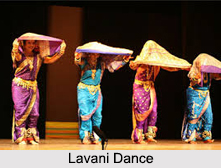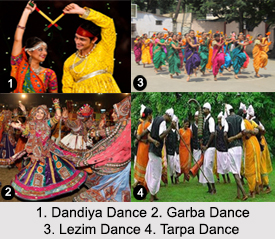 West Indian Dances are detailed and rich in style and its appearance is set in the traditional pattern. The folk dances of the western region however, have their beginning in the rural village and at present they are equal to the culture of the Indian masses. These regional dances of western India reflect vast cultural diversity of the region and are considered to be the higher form of art.
West Indian Dances are detailed and rich in style and its appearance is set in the traditional pattern. The folk dances of the western region however, have their beginning in the rural village and at present they are equal to the culture of the Indian masses. These regional dances of western India reflect vast cultural diversity of the region and are considered to be the higher form of art.
The music as well as dance of this region is loaded with a field of various influences. The states lying in the western part of the country boasts of innumerable dance forms which have a mixture of the expressions of folk and tribal dance forms. Each dance form has a specialty of its particular region. Furthermore, the dance forms of the western region are lively and colourful.
Different West Indian Dances
Following are the Different West Indian Dances:
Dandiya Dance: Among the vibrant West Indian Dances, "Dandiya" is one of the mesmerizing folk dances of Gujarat which has earned recognition from all over the country as well as abroad for its rhythmic tunes and captivating movements. The dance is known for its exciting flow of colours and brightness whereas the enriching illustration of the dance crowns it as one of the renowned dances of India.
Garba Dance: The Garba Dance is immensely popular in Gujarat. It is performed as an honour of Mother Divine, the goddess "Kali" or "Durga" who is sacred in Gujarat as "Amba Mata" or "Mataji". Garba Dance is basically a women"s dance but it is common in men also. It is performed at numerous favourable occasions and social events.
 Garbi Dance: It is a dance by men only. "Garbi" is a dance in honour of "Amba Mata", like "Garba". It is performed around a photo or a statue of the Goddess with a lighted lamp or a small basket containing earth (soil) and developed grains, called a "jawara".
Garbi Dance: It is a dance by men only. "Garbi" is a dance in honour of "Amba Mata", like "Garba". It is performed around a photo or a statue of the Goddess with a lighted lamp or a small basket containing earth (soil) and developed grains, called a "jawara".
Tippani Dance: The "Tippani" gets its name from the hammers or tampers, called "tippanis", they use to hammer the ground. Women are employed to organize the floors of houses and beat the clay with mallets. They do this work in the form of a dance and sing in adding up.
Goaf Dance: This dance is derived from the "Dandiya Raas". Coloured ribbons or ropes are hanged from the peak of a pole and dancers grip the end of the rope in one hand with a short stick in the other. The dancer"s movements are choreographed accordingly that the ropes are hustled and unwoven to make a range of patterns.
Hudo Dance: The "Hudo" is a dance of courtship. Young men and women line up, dressed in their colourful fine clothes, with men in one row and women facing them in another. This energetic dance has particular steps accompanied by clapping.
Ghado Dance: "Ghado" dance moves in a circle, accompanied by songs about everyday life.
Lavani Dance: "Lavani" dance is presented for male audiences. The "Lavani" dance deal with varied topics, like politics, religion, and society. The series of dialogue would exchange with entertaining dance. The dialogues no longer deal with present day situations and the performances use older compositions.
Lezim Dance: "Lezim" dance is presented during the "Ganesh Chaturthi" festival. The activities of "Lezim" dance look like movements of martial art in source. A variety of formations are created in the dance. Sometimes this dance is accompanied by a "dhol" (drum).
Koli Dance: "Koli", or "Kolyacha Naach" is general in the coastal regions of Maharashtra and is named for fisherman, as well as the "Koli" community of fisher folk who execute the dance. It is performed by men and women in pairs.
Tarpa Dance: The tribals of Dadra and Nagar Haveli have their dance form "Tarpa" and the expression of the dance becomes even more appealing during moonlit nights and continues to midnight and is definitely the specific dance of the region.
Fugdi Dance: "Fugdi" is an art form that can be traced to the primeval cultural traditions of Goa. It is a Goan folkdance performed by women in the "Konkan" region, and thus another dance form of western India. These dances are performed in many Hindu religious festivals like Ganesh Chaturthi, "Dhalo" and in other social and religious occasions.




